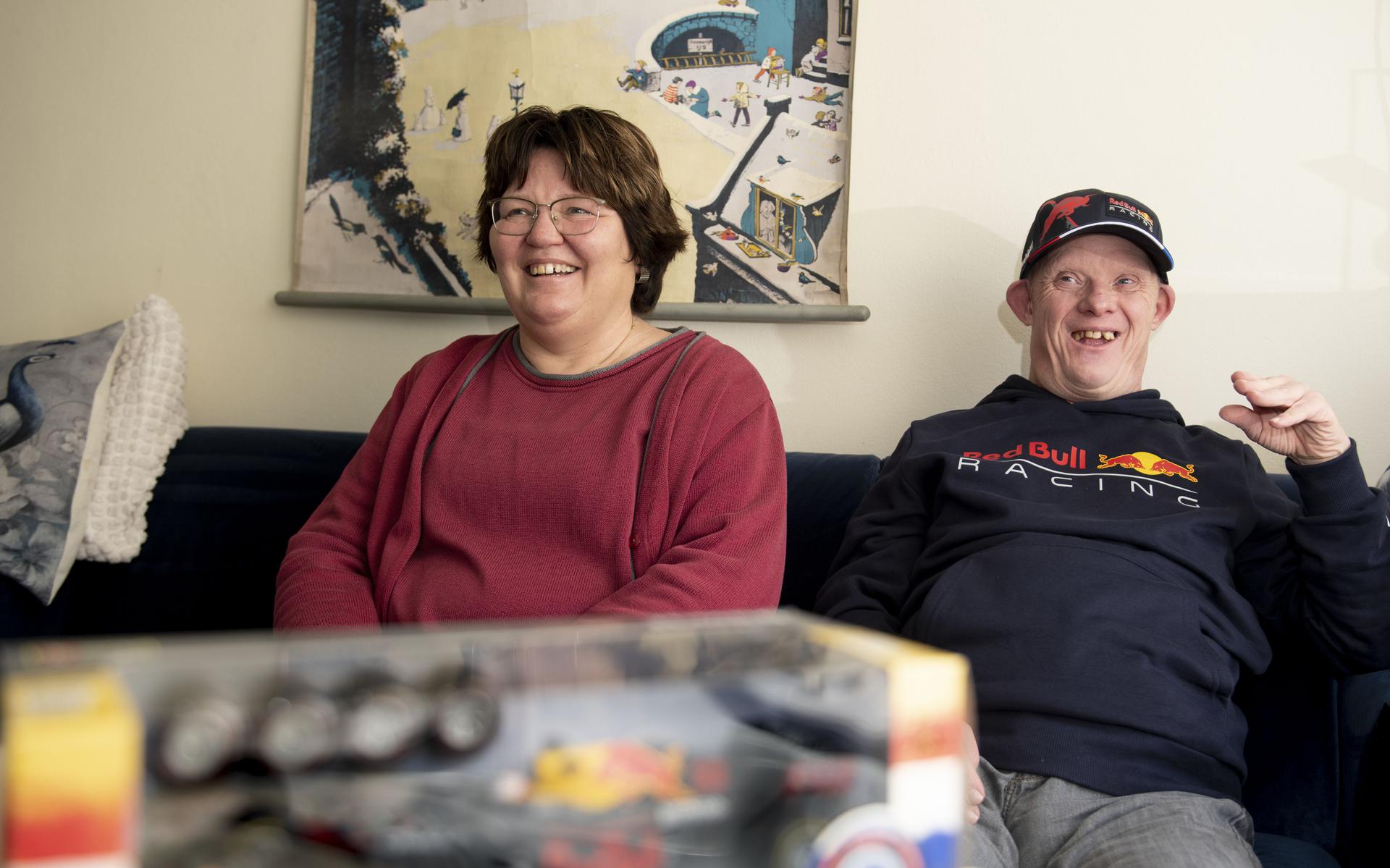Corrie de Jong talks about Huntington’s disease, the hereditary and incurable disease that many families prefer not to talk about. Sick or not, the impact is huge. “And then you hear: you don’t have it. You have to get over it.
Max and Verstappen. 55-year-old Gerrit Krikke is a fanatical fan of two riders. He lives and works at the Alliade in Leeuwarden, but always watches Formula 1 elsewhere in the city, with his sister Corrie de Jong (56). On the sofa with her, he enthusiastically encourages her two heroes. Gerrit and Corrie grew up at Hogwarts in a family with Huntington’s disease. The progressive and incurable brain disorder has been running rampant in their family for generations.
Sword of Damocles
“A disease so serious that no one talks about it.” A poster with this enticing phrase hangs prominently in Corrie’s kitchen window, right next to the front door. This way, she hopes visitors will become curious and actually start the conversation. On Huntington and the consequences of the hereditary disease, which hangs over families like a sword of Damocles. Corrie herself lived for years with the idea that she would slowly decline after her 40th birthday.
In the Netherlands, around 1,700 people have Huntington’s disease and around 6,000-7,000 people are at risk of getting it. Symptoms resemble a combination of dementia, ALS, and Parkinson’s. The cause of the condition is a faulty gene that damages nerve cells in the brain. Corrie always uses the metaphor of Pacman, which bites its way into the brain. “How the disease progresses depends on how many Pacmans there are, how fast they go and what path they travel.”
Very scared
His brother Gerrit, who has Down syndrome, was diagnosed with Huntington’s disease about ten years ago. ,,Gerrit doesn’t know he has the disease and I would like it to stay that way so as not to burden him even more. Occasionally he discovers he is drunk. Because his muscles are constantly making uncontrolled movements. Gerrit gets very scared in those moments, because he loses control.”
Huntington Center of Expertise
Corrie receives directions and advice from the Huntington Hospital in Grou. His brother Gerrit is one of over ninety northern patients who, along with their loved ones the clinic visits for a six-monthly check-up by a multidisciplinary care and treatment team. In the specialized range for daytime activities, the focus is on common problems such as choke, fall, be inactive, react impulsively, be angry, or have gloomy thoughts. The clinic is located in the Friesma State van Noorder residential care center breed. This complex houses ten people with Huntington’s disease. Noorderbreadth is in the process of becoming a Huntington regional center of expertise, where knowledge and experience is shared with other healthcare professionals in the region.
Huntington’s disease is passed on from parent to child. If a father or mother carries the abnormal gene, each child in the family has a 50% chance of inheriting the disease. In Corrie’s case, her baby had Huntington, also her mother, and three uncles, one of whom is still alive. So for years she braced herself for a slow and miserable death, as she had seen in her relatives.
Nothing to do about it
In her early thirties, Corrie decided to get tested for Huntington’s. This has been possible since the discovery of the abnormal gene in 1993. Only 10% of risk carriers do so. “Most people don’t want to know. There’s nothing you can do about it.” A child’s desire is often a reason to do so. This also played with Corrie. “Maybe I wanted children. It never happened because I didn’t have a partner at the time.”
DNA testing showed she didn’t carry the wrong gene. ,,I always thought: I will get sick at forty and then the decline will begin. I’ve lived on that too. On the one hand, she tried to have as much fun as possible, she went on long journeys. But subconsciously I didn’t even dare to enter into permanent relationships. And then listen: you don’t have it, so you can also turn eighty. Very confusing. Suddenly your perspective broadens. Has the deadline expired? You have to get over it.
“I didn’t invent this disease”
After her results, Corrie attended a non-Gen carrier support group for two years. “Huntington’s is a terrible disease, even for family members who test negative. How can you be happy if a very close family member has the disease? People feel guilty. And within some families they are the very ones who are not allowed to complain. Luckily I don’t feel guilty. I didn’t invent this disease.”
Corrie has learned to accept that she still has her whole life ahead of her. She found love and got married in 2015. Huntington is always in her life. Because her brother has it and her sister – who is about to take the test – maybe she too. “One family is not the other, but people prefer not to talk about Huntington. There is a lot of shame. There is fear of the reactions of others. You get “crazy” symptoms when you have the disease, the prospect is nothing short of fun. Even at work I have kept to myself for a long time that Huntington’s runs in the family. I didn’t want to be passed over for a promotion.”
Disease killed
It is therefore called the silent disease by Huntington’s campaign team. In recent years, this team has raised more than 4 million euros for the search for a drug to cure the disease. The possibilities for a cure are promising. Money is still needed which is why Corrie is writing a song about Huntington which she is willing to share via paid Spotify or YouTube. “I can’t cycle a mountain or run a marathon, but I can sing a little. So yeah…every little bit helps.”
Corrie’s action for Huntington


